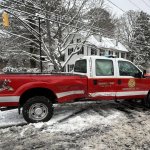CAPE MAY POINT – “We stand at the crossroads of two great migrations, one avian and one marine. We need to tell that story and preserve the natural wonder around us.”
Cape May businessman Robert Mullock speaks with passion as he describes the mission of the evolving Cape May Point Science Center. The organization is repurposing the historic St. Mary by the Sea Retreat House as an educational entity dedicated to the unique environment of New Jersey’s southernmost point.
The 130-year-old religious retreat sits on the shore where the Atlantic Ocean meets the Delaware Bay. The Sisters of Saint Joseph cared for the large Victorian structure for over a century. The financial needs of the order led to the sale of the property.
Mullock stepped in with his vision for a multidisciplinary science center aimed at educating adults and especially young people on the ecological environment that makes the southernmost part of New Jersey so unique.
“If we didn’t do something, it would all be gone,” he said. Active in the community, Mullock also guided the development of the nearby Harriet Tubman Museum in Cape May.
The science center will use donations to offset the cost of annual maintenance on the site and its evolution into a location for display and research.
Mullock said the first tours of the facility will begin this year, targeted at civic groups and non-profits who might share in the development of the center. He beams as he shows the vast open spaces the building makes available.
“There are no display areas of this size anywhere near here,” Mullock says. His vision includes space dedicated to the migration of birds and butterflies. Cape May Point is a critical stop on annual migrations that stretch thousands of miles. In other areas of the building, he sees similar displays focused on the unique marine environment of the coastal waters.
Lying across an open courtyard, he points at the other end of the building set to be dedicated to laboratories and classrooms. The kitchen and dining facilities are not spared Mullock’s vision. He sees a location for dinner lectures and fundraising events.
Mullock says the science center is already at work on formal education programs. The center and its surrounding environment could serve as a location for research and teaching, even leading to degrees at Atlantic Cape Community College and, in time, four-year institutions.
The organization boasts an impressive list of partners, ranging from The Nature Conservancy to Atlantic Cape Community College and from the Audubon Society to the American Littoral Society.
Currently, a website guides the interested public through the center’s vision and provides opportunities for support of that vision.
While the building is impressive and philanthropic attention is welcome, Mullock is compelled by the environment itself. The center’s website calls the area “one of the most vital and bio-diverse ecosystems” in the country. This places the center at a prime location to promote “marine, ornithological and ecological research, education and advocacy.”
Have any thoughts and/or information on this story? Email vconti@cmcherald.com.







